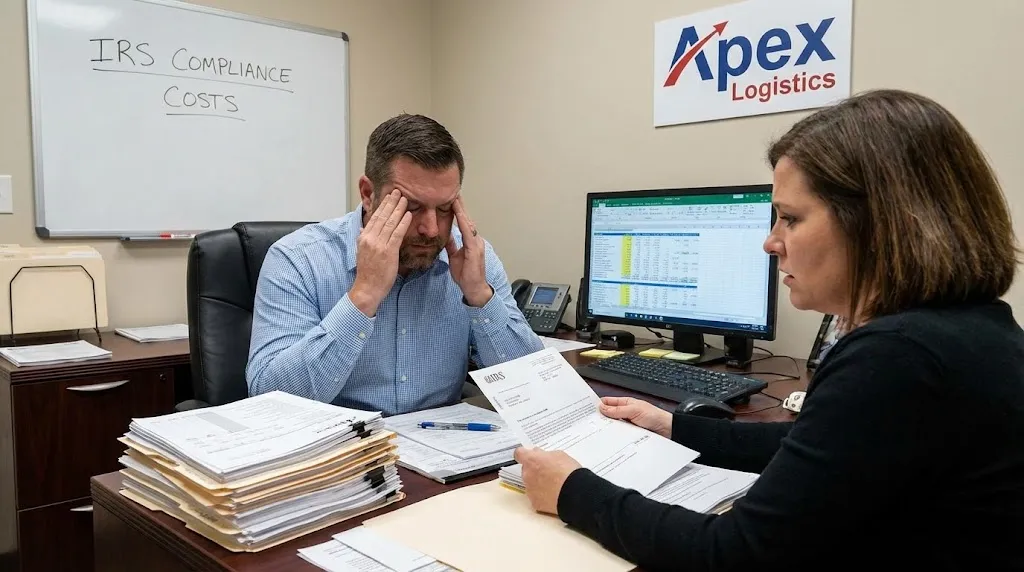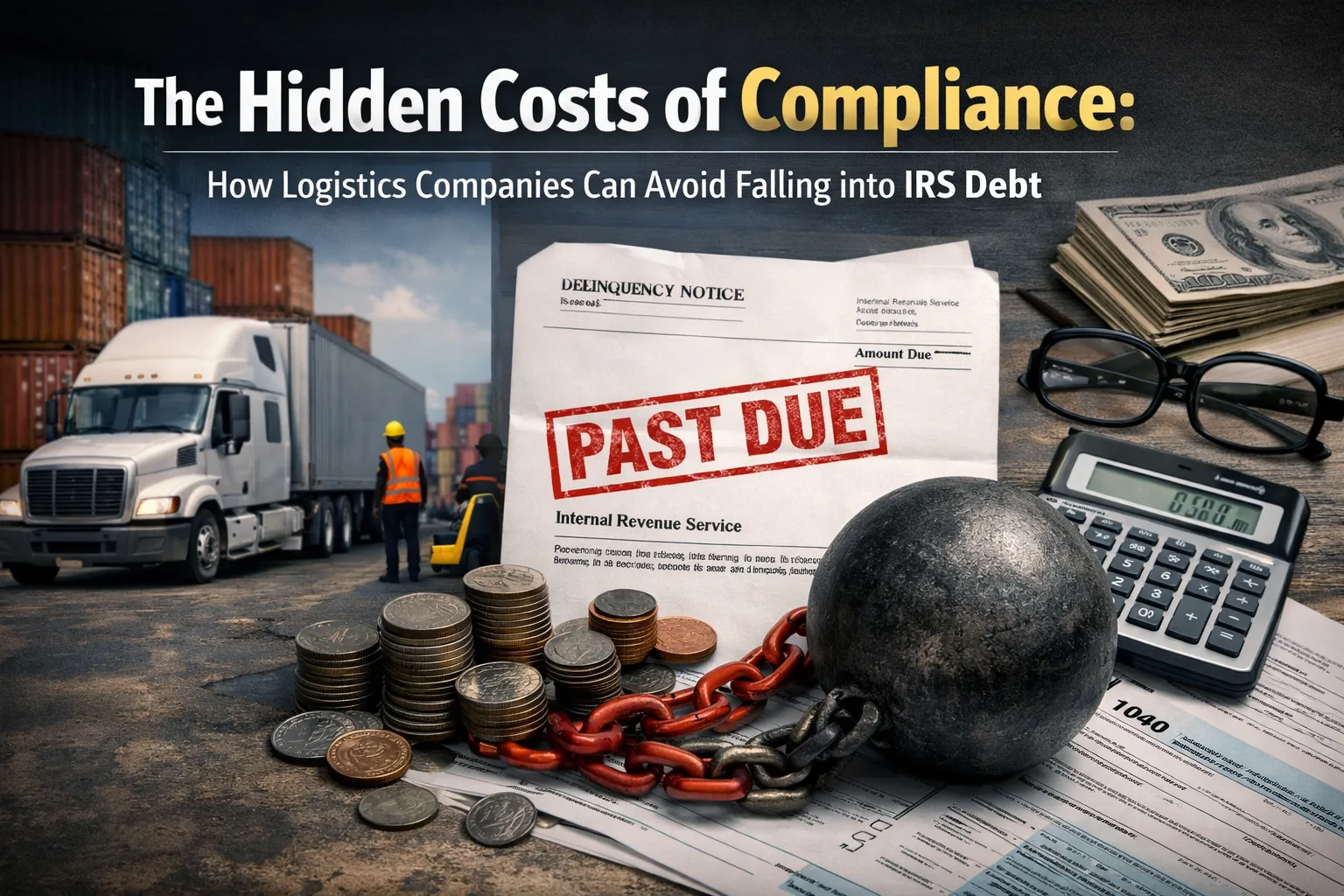Table of Contents
Logistics Companies face growing hidden costs of compliance with tax laws and IRS regulations that can erode profitability if unmanaged. In the United States and globally, tax compliance is not just filing returns; it is managing multistate fuel taxes, income tax deadlines, mileage records, payroll obligations, and international duties. In 2025, logistics operations still confront a tangled web of federal and state tax responsibilities that make compliance a strategic priority rather than a routine task.
Recent industry data shows many logistics firms incurred penalties in 2024 due to fuel credit errors, mileage misreporting, and missed submission dates, and compliance risks are rising. Hidden compliance costs include professional fees, software investments, internal hours spent on tax preparation, and penalties from overlooked requirements. These costs can quietly drain operating budgets and even lead to IRS debt that threatens business continuity. Effective compliance strategies can turn these obligations into operational confidence.
Compliance Costs: What Logistics Companies Must Know

Logistics Companies must account for multiple tax obligations that extend beyond basic income tax. Transportation-related taxes like motor fuel tax and International Fuel Tax Agreement (IFTA) payments require precise tracking of gallons and miles. Compliance is not only federal: state variations in fuel tax rates and highway use fees create a patchwork of duties that firms must reconcile. A failure to align internal reporting systems with these requirements can trigger costly IRS or state audits.
In 2025, advanced IRS audits increasingly use AI and data cross-matching, which raises the stakes for accurate record keeping. Logistics Companies with interstate operations must ensure their accounting and operational data integrate seamlessly. Poor record keeping forces firms to spend extra hours reconciling discrepancies, increasing both internal labour costs and external professional fees. The key takeaway: the more complex your operations, the greater the hidden compliance burden.
The Hidden Price of Non-Compliance
Non-compliance carries both direct penalties and indirect financial drag. Penalties for tax filing errors can include fines, interest charges, and, in extreme cases, enforced payment plans that accumulate interest over time. Logistics Companies that fall behind on fuel tax filings or fail to reconcile multistate tax obligations risk escalating IRS debt that impacts cash flow and credit standing.
In addition to IRS sanctions, non-compliance diverts leadership attention from core logistics functions, deepening operational inefficiencies. Compliance costs are not linear; doubling complexity often more than doubles the cost of avoidance and correction. The takeaway is clear: timely and accurate submissions save more than fines; they preserve operational liquidity and strategic focus. To understand how to avoid this, companies can learn from the Testimonials for Tax Law Advocates, which shed light on effective ways to resolve such tax-related burdens.
Key Areas Where Hidden Costs Accumulate
To make this concrete, we can break down where costs often hide for Logistics Companies.
| Cost Area | Typical Driver | Why It Matters |
|---|---|---|
| Fuel Tax Reporting | Varying state and federal rates | Incorrect filings lead to fines and audit exposure. |
| Mileage and Operating Records | Manual tracking systems | Errors inflate tax liability and invite IRS scrutiny. |
| Payroll Tax Compliance | Worker classification and multistate payroll | Misclassifications trigger IRS penalties and interest. |
| Professional Fees | Tax advisors and software systems | These are not optional; underinvestment increases IRS risk. |
This table highlights that hidden costs are not random: they stem from specific gaps between operational processes and tax requirements. Addressing them directly lowers the likelihood of IRS debt accumulation.
Strategies to Avoid IRS Debt

Logistics Companies must institutionalise clarity and control over tax compliance. The first strategy is automation: adopting tax compliance software that integrates with mileage, fuel, and payroll systems reduces manual errors and saves internal hours. Automated alerts for deadlines and inconsistencies cut risk and free staff for logistics planning rather than tax tracking.
Next, regular internal reviews of compliance status help capture issues early. Quarterly checks of fuel tax reconciliations, payroll filings, and IRS interactions prevent small errors from becoming debt-triggering problems. A robust compliance calendar ensures deadlines are never overlooked and helps firms allocate budget for compliance activities before penalties accrue.
Lastly, cultivating compliance expertise within your organisation reduces dependency on ad-hoc professional advice, lowering ongoing costs over time. Firms with in-house specialists can respond quickly to IRS notices and avoid reactive decision-making. Learn more in our article on Automation in Logistics: The Key to More Efficient Transport and Delivery.
Understanding IRS Enforcement Trends
In 2025, IRS enforcement emphasises accuracy and detailed documentation, especially for businesses with complex tax footprints like Logistics Companies. IRS audit processes increasingly employ data analytics, making fuel and mileage discrepancies easier for authorities to detect.
Rather than viewing compliance solely as a cost centre, leading logistics firms see it as risk management. They systematically align operational data with tax liabilities, yielding more predictable cash flows and fewer surprise liabilities. The essential conclusion is that compliance maturity correlates with financial resilience in a competitive logistics environment.
Bottom Line
Logistics Companies cannot afford to treat tax compliance as an afterthought. The hidden costs of non-compliance, from penalties to diverted leadership focus, can quietly escalate into significant IRS debt. By automating key processes, conducting regular internal audits, and investing in expertise, firms can detect compliance gaps before they become liabilities.
Disclaimer:
This article is for general information only and does not constitute tax, legal, or professional advice.


